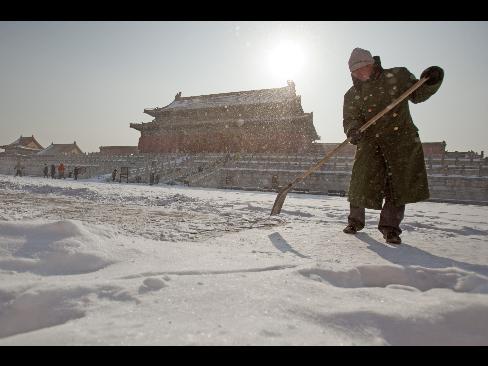
A worker de-ices a walkway at the Forbidden City in Beijing on Jan. 4, 2010. (Bloomberg)
Jan. 4 (Bloomberg) — The heaviest snowfall to hit Beijing and Seoul in more than half a century grounded hundreds of planes in the two capitals as temperatures in northern China were set to fall to the lowest in 50 years.
Beijing Capital International Airport canceled more than 500 flights today as of 2 p.m. local time, China Central Television reported. Gimpo Airport in western Seoul grounded 187 flights as of 2 p.m. local time, the Ministry of Land, Transport and Maritime Affairs said in a statement.
Chinese Premier Wen Jiabao called on local authorities to ensure food supplies, agricultural production and the safety of transportation, the official Xinhua News Agency reported. South Korea mobilized 5,000 soldiers to remove snow from blocked roads, Yonhap News reported today.
Suburban areas of Beijing received more than 33 centimeters (13 inches) of snow yesterday, the Beijing Daily reported. It was the capital’s heaviest daily snowfall since 1951, Xinhua reported.
Among those affected by the weather were Hong Kong Financial Secretary John Tsang and Hong Kong Monetary Authority Chief Executive Norman Chan. Their flight to Beijing last night was delayed by heavy snow and the visit was canceled this morning, Patrick Wong, Tsang’s press officer, said by telephone.
About 90 percent of Beijing’s more than 1,300 flights yesterday were canceled or delayed, according to state broadcaster CCTV. At least three airports in China’s Shandong province were closed today due to the blizzards, it reported.
Schools Closed
Elementary and middle schools in Beijing and the neighboring city of Tianjin were suspended today because of the snow and low temperatures, the city governments said. Tianjin got as much as 20 centimeters of snow yesterday, CCTV reported.
More than 15,000 people were dispatched to remove snow that had forced the closure of 30 highways in northern China, the Ministry of Transportation said on its Web site.
The South Korean capital was hit today by the heaviest snowfall since 1937, receiving 25.8 centimeters of snow as of 2 p.m. local time, according to the state-run weather agency.
The city of Incheon, 80 kilometers west of Seoul, was covered by 30 centimeters of snow, according to the agency. Incheon’s airport delayed 165 flights as of 2 p.m. today, the Ministry of Land, Transport and Maritime Affairs said.
The snowfall in South Korea, concentrated in the mountainous central portion of the nation, is expected to end tonight, according to the Korea Meteorological Administration.
Snow Forecast
More snow and freezing rain was forecast in the Chinese provinces of Shandong, Shaanxi, Hubei, Hunan, Jiangxi, Jilin and Heilongjiang, according to the China Meteorological Administration. Parts of Hunan and Jiangxi province may be hit by heavy snow tomorrow, the weather bureau said.
Temperatures in Beijing could drop as low as minus 14 degrees Celsius (6.8 degrees Fahrenheit) today and may fall to minus 16 degrees Celsius tomorrow, according to the administration. Temperatures in northern China tomorrow could hit a 50-year low, CCTV reported.
The blizzards today trapped a train in northern China traveling from the city of Harbin to the city of Baotou, CCTV reported. More than 1,400 passengers were rescued, according to the state broadcaster.
Vegetable prices in the Chinese capital have surged as much as 125 percent as the heavy snowfall damaged greenhouses and hampered deliveries, Beijing Daily reported today.
The Ministry of Agriculture dispatched seven teams to help farmers ensure agricultural production, Xinhua reported late yesterday. They were sent to the provinces of Hebei, Liaoning, Jiangsu, Shandong and Anhui to help repair damaged greenhouses and improve the use of water and fertilizer, the state-owned agency said.
Power Supply
Heavy snowfall in northern China also spurred concerns of possible shortages of fuel and electricity. State Grid Corp. of China ordered local units to intensify checks on power lines and substations to prevent widespread blackouts, Xinhua said.
Some cities are limiting electricity supply as coal stockpiles run low, China Business News reported today, citing an unidentified official from the State Electricity Regulatory Commission. Power plants connected to State Grid Corp. of China’s networks had 8.94 million metric tons of coal stored, sufficient for 10 days’ consumption, as of Dec. 28, the Shanghai-based newspaper reported.
— Tian Ying, Irene Shen, Jiang Jianguo, Alfred Cang, Li Yanping, Kyunghee Park, Sangim Han, Sungwoo Park, Eugene Tang. Editors: John Liu, Nerys Avery
To contact Bloomberg News staff on this story: Tian Ying in Beijing at +86-10-6649-7571 or [email protected] Irene Shen in Shanghai at +86-21-6104-7022 or [email protected]
Last Updated: January 4, 2010 04:15 EST
Source: Bloomberg
1 thought on “Beijing and Seoul Hit by Heaviest Snow in More Than Half Century”